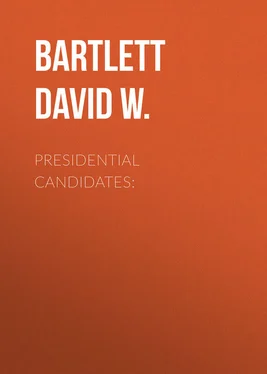David Bartlett - Presidential Candidates:
Здесь есть возможность читать онлайн «David Bartlett - Presidential Candidates:» — ознакомительный отрывок электронной книги совершенно бесплатно, а после прочтения отрывка купить полную версию. В некоторых случаях можно слушать аудио, скачать через торрент в формате fb2 и присутствует краткое содержание. ISBN: , Жанр: foreign_antique, foreign_prose, на английском языке. Описание произведения, (предисловие) а так же отзывы посетителей доступны на портале библиотеки ЛибКат.
- Название:Presidential Candidates:
- Автор:
- Жанр:
- Год:неизвестен
- ISBN:http://www.gutenberg.org/ebooks/35400
- Рейтинг книги:4 / 5. Голосов: 1
-
Избранное:Добавить в избранное
- Отзывы:
-
Ваша оценка:
- 80
- 1
- 2
- 3
- 4
- 5
Presidential Candidates:: краткое содержание, описание и аннотация
Предлагаем к чтению аннотацию, описание, краткое содержание или предисловие (зависит от того, что написал сам автор книги «Presidential Candidates:»). Если вы не нашли необходимую информацию о книге — напишите в комментариях, мы постараемся отыскать её.
Presidential Candidates: — читать онлайн ознакомительный отрывок
Ниже представлен текст книги, разбитый по страницам. Система сохранения места последней прочитанной страницы, позволяет с удобством читать онлайн бесплатно книгу «Presidential Candidates:», без необходимости каждый раз заново искать на чём Вы остановились. Поставьте закладку, и сможете в любой момент перейти на страницу, на которой закончили чтение.
Интервал:
Закладка:
Mr. Dixon refused to admit the correctness of this assertion as an exposition of the general southern feeling.
Mr. Bell traced the rise and progress of the filibuster spirit, until it culminated in the Ostend manifesto, and became reflected in this Cuban bill. Both were in a form offensive to Spain. No nation would be apt to receive kindly an offer made to purchase its territory when accompanied by a studied reminder of its fallen fortunes. His (Mr. Bell's) opinion was that the Ostend manifesto and the present proposal were framed on the perfect knowledge that Cuba could not be acquired, and that they were addressed to what is supposed to be the dominant traits in our national character. The committee's report is skillfully drawn up. It promises to extend the trade and commerce of the North, the peculiar industry of the South, and the agriculture of the West. It is framed to habituate the country to the cry of "war," but we are making no preparation for war. On the contrary, we are trying to get along without a revenue. For himself, he would favor our acquiring control of the island, either as a protectorate or independent power; but he likewise held that the time has not yet come when its possession was necessary, either to our development or security. We are not now in position to accept Cuba, if Spain should offer it as a gift. We cannot accept it until we have built up a navy of sufficient strength to maintain it. The first blow that would be struck in a war with a naval power would be to wrest it from us, and hold its harbors as a means of annoyance against us. The committee's promise that the acquisition of the island will give us the monopoly of sugar is equally fallacious. The increasing production of that article would soon create its production throughout the whole temperate zone. Neither is it true, as the committee says, that when a nation ceases growth, its decadence commences. History does not teach this doctrine of expansion, nor is there any parallelism between the growth of a nation and an individual man. Are our internal affairs so perfectly organized as to leave no range for our ambition? Has even the question of currency been placed on a satisfactory basis? Is our great internal domain reduced to such narrow limits as to afford no scope to our energies? Our territory is now greater than the whole area of the Roman Empire. All this we are bound to protect and defend; and to defend the accessible points of our extended frontier would require 100,000 men, with at least 250 war steamers. The chairman of the Naval Committee says our whole guns are 1,100. The French navy alone has 15,000 cannon afloat, with 500 ships, of which half are war steamers. We are not now prepared for such a war; and yet the President announced, on a recent occasion, that our policy henceforth is expansion.
Mr. Kennedy, of Maryland, addressed the Senate, arguing that the acquisition of Cuba is subversive of the best interests of the South. Referring to the aspect of our domestic affairs, he considered that innovations had been ingrafted on the policy of this government, which inevitably betokens its dissolution. The doctrine of State Rights did well while we were a homogeneous people, bound together by common troubles; but that day has passed. The unbounded prosperity of this country, its fertile lands, and increasing wealth, have attracted to it people from every clime. There is no common interest to bind us together. The Constitution and the Supreme Court are derided, and the Constitution threatens to be but a rope of sand, unable to bind, from having no power to punish infractions of that Constitution. He had been derided as an old Federalist, and the men who so denounced him had now on the table two bills more dangerous, in consolidating the power in the hands of one man, than any that ever emanated from the old Federal party. They had also a bill to give away the public lands to the sweepings of European lazar-houses, to squat thereon, and, under an easy franchise, to control that government, before they know a word of our language, or have one idea toward a comprehension of our institutions. Yet, while offering this extraordinary bonus to the discontented spirits of the old world, they refuse to vote for and denounce the old soldiers' bill. How comes it, he asked, that there is such a diversity of opinion in the democratic party, marching under one banner, and professing common principles?
He proceeded to ask how it is possible for us to hold Cuba, with but fifty-seven ships in our navy to protect the fifty Cuban harbors? Our Paraguay armada consists of canal-boats, and side-wheel steamers. Have senators reflected on the baneful effect the acquisition of Cuba would have on slave property? He remembered the opening of Alabama. Virginia has scarcely yet recovered from the effect of that exodus of her labor to localities where it would be more remunerative. With the slave trade stopped, Cuba would be a perpetual drain, and would put planters into a more unequal contest by withdrawing the labor from their cotton fields into sugar production. It is estimated that five hundred thousand slaves will be abstracted from the southern States, and a thousand millions of capital, within five years. And if we drift into a war with England and France, we will have to maintain a contest with fifteen hundred ships on our extended coast line. These are considerations, for the American people, as they will change the whole course of our policy, and inaugurate a new era of standing armies and enormous fleets. The time is also inopportune for the acquisition of that island. In conclusion, he did not admit the right to bring in a foreign nation, with a foreign tongue and foreign teachings, and incapable of understanding our institutions. In his opinion, we were fast losing all those landmarks which characterized our early nationality, and were fast becoming a mere confederation of heterogeneous States. For these and other considerations, he was opposed to the acquisition of Cuba.
Mr. Wade here moved to adjourn. Lost by 17 to 28.
At eight o'clock in the evening the Senate was crowded – the galleries were one sea of faces. The Republicans wanted to adjourn the discussion to the next day – the Democrats were determined to force a vote on the bill that evening.
Mr. Doolittle, of Wisconsin, moved to postpone the Cuba and take up the homestead bill, and proceeded to speak on the latter.
Mr. Slidell called him to order.
Mr. Doolittle insisted on his motion.
Mr. Johnson, of Tennessee, although he had for fifteen years advocated the homestead bill, asked Mr. Doolittle to withdraw his motion.
Mr. Douglas, as a friend of the homestead bill, made the same request.
Mr. Clark, of Connecticut, as a friend of the homestead bill, moved the Senate adjourn. Lost, by 17 to 30.
Mr. Trumbull asked Mr. Hunter to pledge himself not to bring forward the appropriation bills, to prevent a vote on the homestead bill.
Mr. Hunter would give no such promise.
Mr. Trumbull appealed to Mr. Johnson to stand by and press the homestead bill.
Mr. Bigler asked Mr. Trumbull, for himself and the Republicans, to name the hour at which they would vote on both measures.
Mr. Trumbull, for himself, was ready now, but could not make any pledge for his friends.
Mr. Seward said that after nine hours' discussion on the Cuba bill, it was time to come back to the great question of the age. Two propositions now stand face to face; one is the question of land for the landless, and the other is a question of land for slaves.
Mr. Slidell here rose.
The Vice-President. Will the Senator from New York yield the floor to the Senator from Louisiana?
Mr. Seward. No, sir, I do not.
Mr. Slidell called Mr. Seward to order. He was discussing the comparative merits of the two bills.
The Vice-President decided that Mr. Seward was in order.
Читать дальшеИнтервал:
Закладка:
Похожие книги на «Presidential Candidates:»
Представляем Вашему вниманию похожие книги на «Presidential Candidates:» списком для выбора. Мы отобрали схожую по названию и смыслу литературу в надежде предоставить читателям больше вариантов отыскать новые, интересные, ещё непрочитанные произведения.
Обсуждение, отзывы о книге «Presidential Candidates:» и просто собственные мнения читателей. Оставьте ваши комментарии, напишите, что Вы думаете о произведении, его смысле или главных героях. Укажите что конкретно понравилось, а что нет, и почему Вы так считаете.










